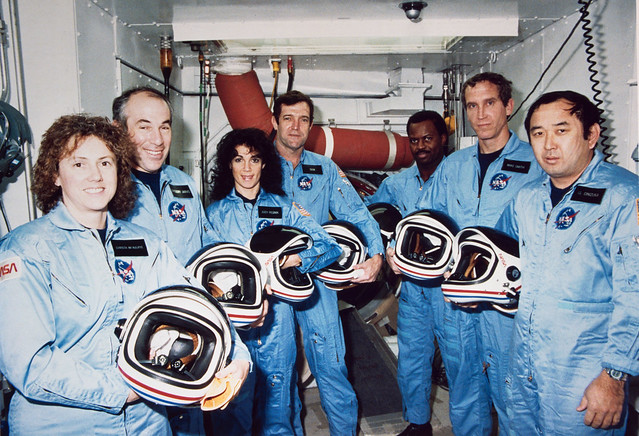
Cooper Griggs
Shared posts
Artistic Arrangements of Microscopic Algae Viewed Through a Microscope
Cooper Griggsegads, the patience to do this... cripes

Photograph of diatoms collected in Russia and arranged on a microscope slide in 1952 by A.L. Brigger.

Photograph of fossil diatoms collected in Pt. Reyes National Seashore in Marin County, California, and arranged on a microscope slide in 1968 by A.L. Brigger.

Black and white photograph of fossil radiolaria arranged on a slide by R.F. Behan. The slide label reads “Prize Medal Paris 1867 Polycystina; Springfield, Barbados.” The arrangement is approximately 3 millimeters in diameter.

Photograph of diatoms arranged on a microscope slide by W.M. Grant.

Photograph of diatoms arranged on a microscope slide by W.M. Grant.

Photograph of diatoms arranged in October 1974 on a microscope slide by R.I. Firth. The slide label reads “Selected species from Californian fossil marine localities. To Mrs. G Dallas Hanna with compliments.”

Photograph of Arachnoidiscus diatoms collected in the Bolinas Lagoon in Marin County, California and arranged on a microscope slide by R.F. Behan.
In a fascinating blend of art and science the California Academy of Sciences possesses a rare collection of microscopic diatom arrangements. Diatoms are a major group of algae that are among the smallest organisms on Earth, of which nearly 100,000 different species are estimated to exist. While there are numerous examples of diatoms that have been photographed for scientific study, these particular scientists hobbyists seem to have gone a different direction, instead turning these tiny unicellular lifeforms into mandala-like artworks. The tiny designs are all the more amazing when you consider most of them would fit on the head of a nail. You can see more examples right here. Photos by Sara Mansfield. (via Synaptic Stimuli)
Update: The California Academy of Sciences clarifies that these arrangements, despite being produced with scientific tools, are purely aesthetic, and were produced by hobbyists, not scientists.
tumblr_lx6mflb4cZ1qjhe3mo1_500.jpg 492×700 pixels
Cooper Griggsaaaaaand now i'm hungry
The Number One Question Asked When Buying a Car
New Geometric Tape Art from Aakash Nihalani










Working with bold isometric forms created from bright neon tape, New York artist Aakash Nihalani (previously here and here) transforms outdoor spaces into playful installations. Of his work Nihalani shares:
For however briefly, I am trying to offer people a chance to step into a different New York than they are used to seeing, and in turn, momentarily escape from routine schedules and lives. We all need the opportunity to see the city more playfully, as a world dominated by the interplay of very basic color and shape. I try to create a new space within the existing space of our everyday world for people to enter freely , and unexpectedly ‘disconnect’ from their reality.
Seen here is a collection of his work from the last year or so. If you happen to be in Rome in April you can catch a solo show of new work at the Wunderkammern. (via Unurth)
01.29.2014

Copy this into your blog, website, etc.
...or into a forum
[IMG]http://www.flashasylum.com/db/files/Comics/Dave/dontletthesungodownonmewasoriginallycalledpleaseletyoursongodownonmebeforesomeonetoldeltonjohnthatitwasntkosher.png[/IMG][/URL]
Cyanide & Happiness @ [URL="http://explosm.net/"]Explosm.net[/URL]
Kshama Sawant to Take Home $40,000 in Pay out of her $117,000 City Council Salary
During her successful campaign for Seattle City Council, Socialist Alternative candidate Kshama Sawant repeatedly promised to take accept no more salary than the average Seattle worker. Today, in a press release, she announced what that specifically means—$40,000 a year after taxes—and what she plans to do with the remainder of her $117,000-plus salary:
“The people of Seattle elected me as a socialist on the platform of a $15/hour minimum wage, for affordable housing, and to tax the rich to pay for public transit and education. In addition, I strongly support all efforts to increase wages. Data shows Seattle median wages for men at $60,000 while only $51,000 for women; and people of color earn only 45% of the median income of white workers. I will fight to close the gender pay gap and to overcome the structural racism in working and living conditions.
“Seattle City Councilmembers receive over $117,000 a year – the second highest of any city council in the country. Inevitably, such a salary removes Councilmembers from the realities of life for working people. I will only take home $40,000 per year. This amount is roughly the full-time take-home pay of a Seattleite.
“After paying taxes, the remainder of my salary will go to a Solidarity Fund to help build social justice movements. Throughout the year I will be making donations from this Solidarity Fund to causes such as workers’ strike funds, and environmental, civil rights, and women’s rights campaigns.Sawant promises “regular and transparent accounting” of her Solidarity Fund, and has already pledged two donations: $500 to Puget Sound SAGE and $15,000 to15Now.org.
So there you go, Sawant-hating comment trolls: Promise made, promise kept.
This is pretty amazing and very very rare.
Volkswagen’s Super Bowl Ad Shows German Engineers Earning Their ‘Wings’ Every Time a VW Hits 100K Miles
Volkswagen has released “Wings,” their new Super Bowl ad that shows German engineers earning their wings and rainbows every time a Volkswagen hits 100,000 miles.
via Volkswagen USA
A Kinetic Sculpture Creates the Illusion of a Rotating Head

I’m digging this kinetic sculpture by Swiss artist Markus Raetz (previously) that creates the illusion of a rotating head using a series of silhouettes cut from metal panels. Most of Raetz’s work involves aspects of perception and illusion, more of which you can see here. (via Sploid)
PACIFIC RIM Motion Capture Lesson: EP 110: Hollywood Acting...
PACIFIC RIM Motion Capture Lesson: EP 110: Hollywood Acting Studio
Check out episode 10 of the wacky comedy series I helped create! Lots of funny stuff!
Remembering the Challenger Crew
The NASA Goddard Space Flight Center shared this morning this photo of the Challenger crew. The NASA family lost seven of its own, 28 years ago, on the morning of Jan. 28, 1986, when a booster engine failed, causing the Shuttle Challenger to break apart just 73 seconds after launch.
Via NASA: “In this photo from Jan. 9, 1986, the Challenger crew takes a break during countdown training at NASA’s Kennedy Space Center. Left to right are Teacher-in-Space payload specialist Sharon Christa McAuliffe; payload specialist Gregory Jarvis; and astronauts Judith A. Resnik, mission specialist; Francis R. (Dick) Scobee, mission commander; Ronald E. McNair, mission specialist; Mike J. Smith, pilot; and Ellison S. Onizuka, mission specialist.”
Photo by NASA Goddard Space Flight Center.
The Gap: A New Typographic Interpretation of Ira Glass’s Iconic Quote About the Creative Process

This beautiful visual accompaniment to Ira Glass’ iconic quote about the creative process was created by Daniel Sax after encountering a similar video by David Shiyang Liu that was shared extensively back in 2012. Great to see such a wonderful sound bite still inspiring people to make new stuff. (via Quipsologies)
RNC Calls For Halt To Unconstitutional Surveillance
Read more of this story at Slashdot.
The cat's face the entire time makes this
Intel’s voice recognition will blow Siri out of the water—because it doesn’t use the cloud

There’s a problem with today’s voice recognition systems: They’re just too slow. Anyone who has waited in frustration while Siri or Google’s Voice Search “thinks” about even the simplest commands knows what I’m talking about.
The problem isn’t voice recognition software per se, which is more accurate than ever. The problem is that voice recognition is still a challenging enough problem, computationally, that all the major consumer platforms that do it—whether built by Google, Apple or Microsoft with the new Xbox—must send a compressed recording of your voice to servers hundreds or thousands of miles away. There, computers more powerful than your phone or game console transform it into text or a command. It’s that round trip, especially on slower cellular connections, that make voice recognition on most devices so slow.
Update: To clarify, Google has had offline voice recognition since Android 4.1, but it’s still in the experimental phase and isn’t available to non-Google developers of apps. In addition, Scott Huffman, head of the Conversation Search group at Google recently told me that while Android can do some offline processing of voice commands, it’s much less accurate than what Google can accomplish when it sends your voice to the cloud.
Intel wants to process your voice right here, instead of in the cloud
Intel has a solution, says the company’s head of wearables Mike Bell in an exclusive interview with Quartz. Intel partnered with an unnamed third party to put that company’s voice recognition software on Intel mobile processors powerful enough to parse the human voice but small enough to fit in the device that’s listening, no round trip to the cloud required. The result is a prototype wireless headset called “Jarvis” that sits in the wearer’s ears and connects to his or her smartphone. (Perhaps coincidentally, Jarvis is also the name of the voice recognition and artificial intelligence software in the Iron Man franchise.) Jarvis can both listen to commands and respond in its own voice, acting as both a voice control and a personal assistant.
Not only is Intel’s voice recognition solution more responsive than those offered by its cloud-obsessed competitors, but it also leads to what Bell calls “graceful degradation,” which means that it works even when the phone it’s connected to is not online.
Voice commands that work even when you’re not connected
“How annoying is it when you’re in Yosemite and your personal assistant doesn’t work because you can’t get a wireless connection?” says Bell. “It’s fine if [voice recognition systems] can’t make a dinner reservation because the phone can’t get to the cloud,” he adds. “But why can’t it get me Google Maps on the phone or turn off the volume?”
Processing voice commands right on the device is one of those trivial but not so trivial innovations. As cloud and Internet of Things journalist Stacey Higginbotham has observed, people won’t want to wait three or more seconds when we command our automated house to “turn on the lights.” For true voice interaction with computers, the kind that involves clarifications and a genuine dialogue, our devices are going to have to respond to our voice just as quickly as a human would—or even faster.
Voice recognition performed right on a computer has been available on desktop computers for several years, but the processors in mobile phones and other mobile or wearable computers simply haven’t been powerful enough to accomplish the same feat until now. As it moves into mobile with products like the just-announced Edison PC-on-a-chip, Intel pitches its expertise in making powerful microchips for servers and PCs as a unique advantage for making the world’s most powerful mobile processors, which are typically much less capable than the ones that are Intel’s bread and butter.
Coming to a phone or wearable near you
Bell says that Intel is working on selling its voice recognition technology to unnamed mobile phones manufacturers, which could allow them to differentiate themselves from Apple and Google’s usual offerings—or the tech could go into phones by those companies.
The result could be voice-recognizing devices with which we can have an actual conversation. That could mean something as simple as telling our phones to “please email Mike,” followed by the phone asking which “Mike” we mean. It will also, inevitably, mean something like the artificially intelligent conversation systems pictured in Iron Man, transforming our computers into something like true personal assistants.



















